Introduction
There are so many questions on the mind of many people that want to start an aquaculture business, especially fish farming.
Questions like how to start a fish farm, the cost of raising a fish, types of ponds, how to make money from fish farming, and so.
Fish farming (or pisciculture) involves raising fish in ponds either for personal consumption or for commercial purposes. It is one of the most lucrative agriculture businesses anyone can start.
Fish contains omega 3 and is a very good source of protein compared to beef.
Different types of fish can be raised for commercial purposes but the most common ones are catfish, tilapia, and crab.
Compared to other types of livestock businesses like cattle, goats, cows, etc, fish farming requires less space but needs more freshwater for optimal performance.
How To Start A Fish Farm
Do you want to start a fish farm? You need to know the basic requirements for starting a fish farm.
If you want to start a fish farm, especially catfish farming, there are some basic things you need to put in place for you to successfully run the business.
Have A Plan
The first thing you need to do for you to be able to start and run a successful fish business especially if you want to run a commercially profitable business is for you to have a plan.
You don’t want to go into fish farming without knowing how much it will cost to run the business, the requirements for running the business, how you will market the business, and the other factors to consider before starting the farm.
Do Some Research
The next thing you want to do after having a plan and determining the amount it will cost you to start a fish farm is to conduct some market research.
If you are a novice and have no prior knowledge about fish farming, you will not want to start a farm and set yourself up for failure.
One of the best things you can do for yourself is to go around and seek training from professionals that know about the business. You can also watch videos online but it will be advisable to get physical training as well.
There are some things that you will get to discover when you attend physical training that will be hidden from you if you only watch videos.
This way, you will broaden your horizon on the business, and by the time you decide to start, it will be a jolly ride for you.
Determine The Size Of Your Farm
Now that you have a plan and you have gotten some training, the next thing you need to do to determine the size of your farm.
This is very important because you cannot just work without knowing how big or small your farm will be. The size of your farm will depend on your pocket.
While I will advise you to start on a small scale as a beginner, the final decision is still left for you to make.
Requirements For Starting A Fish Farm
After all the above factors have been put in place, you need to know the requirements for starting a fish farm.
1. Capital

The first requirement if you want to start a fish farm is funds. You need money to buy the things you will use to run your farm.
As I said earlier, the capital you will need will be dependent on the size of your farm.
The amount needed to start a farm of 1,000 fish will be different from that of 3,000 fish. Although some costs might be the same.
Fish farming is capital intensive if you are going to be running it for commercial purposes but not as much as poultry farming.
You can read the article I wrote where I compared poultry farming and catfish farming.
2. Location
The next thing you need to start a fish farm is the location of your farm. This can be your house, a rented farm, or your personal property. No matter the location, make sure that it is somewhere that is safe and also easily accessible.
It is advisable to get waterlogged land (if you want to use an earthen pond). If this is not possible, your farm should have a good drainage system to dispose of dirty water.
This is important because you will be disposing of a lot of water regularly.
If you want to go commercial or just want to get a land, there are factors you need to consider before paying for the land. You can read the article on how to choose the best location for your farm HERE, it will help you alot.
3. Ponds
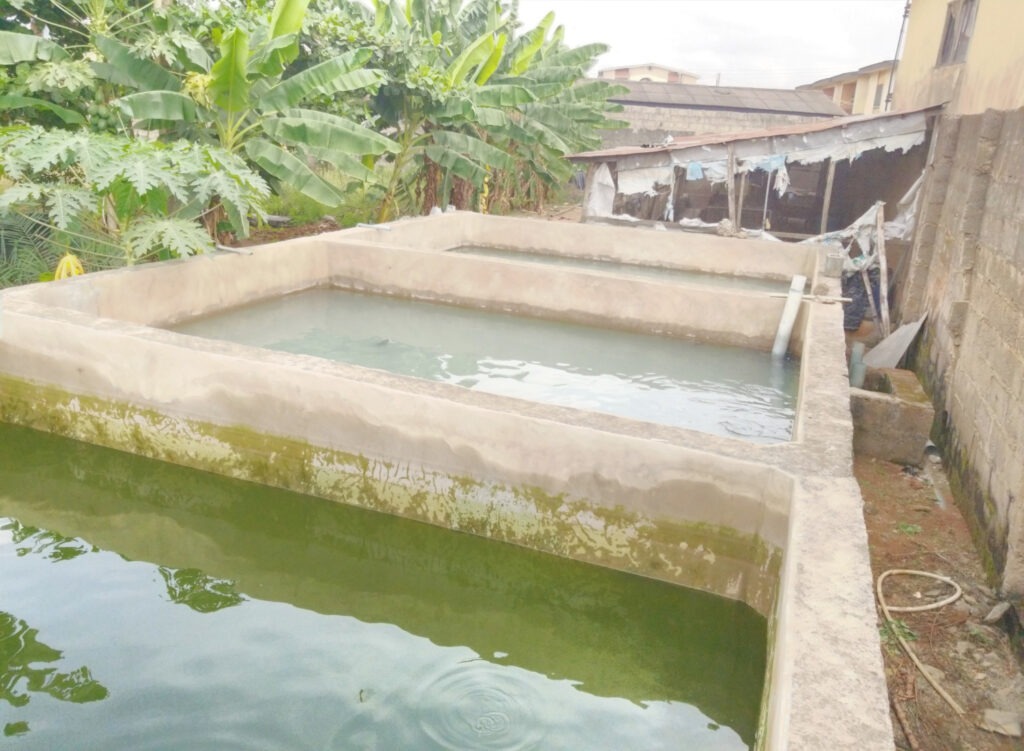
The third requirement to start a fish farm is a pond.
How will you start a fish farm without a habitation?
Ponds are where you will put the fish when it is time to stock them.
There are different types of ponds that you can use to raise your fish.
When choosing the type of pond to raise your fish, make sure it is one that will be easy to manage for you.
The cost of constructing a pond depends on the type of pond you eventually want to use for raising the fish.
4. Water
Fish is an aquatic animal. Fish need water to survive.
One of the things you need to put in place if you want to start a fish farm and succeed is a good water system. A good source of water will give you peace of mind and will make your fish grow faster.
Your source of water can natural source (stream, river), well, or borehole. The first thing you can do before stocking your fish is to test the pH of the water you want to use to raise your fish.
A high or very low water pH can be dangerous for your fish (especially if you want to start hatching). You need to make sure that you have a good source of water. It is very important to note that where your farm will be located should be where there will be a constant supply of water.
5. Source of Power (Electricity)
The next thing you need to start a fish farm is a source of power. Why do I need power on my farm? You will need to change the water of your fish regularly, so you need something to pump the water.
You might decide to buy a generating set, install a solar power system, or rely on government provided power. Whatever your choice is, power shouldn’t be in shortage on your farm.
Except you’re running a cage system or an earthern pond, then you might not worry alot cos you’ll not be changing water all the time unlike the other system of fish farming.
6. Overhead Tank
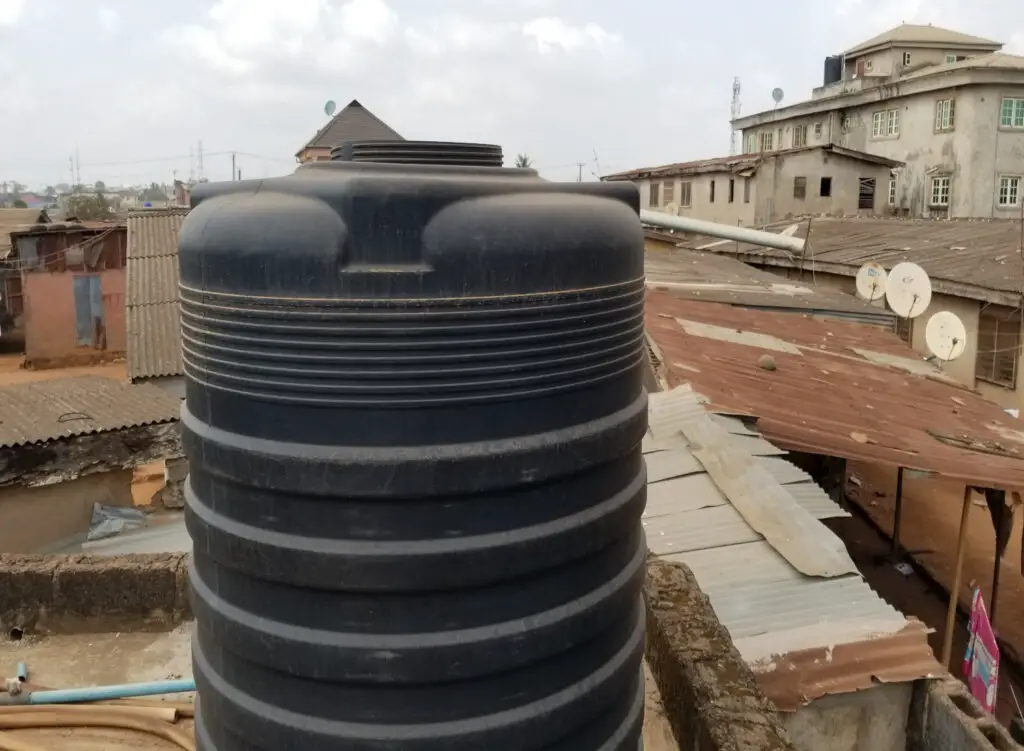
This goes alongside your water. If you are starting small, you will need an overhead tank where you will store water for later use should in case there is no power and you need to change the water in the pond where you stock your fish.
There are different sizes of overhead tanks you can use.
You can also build a reservoir on your farm.
7. Nets
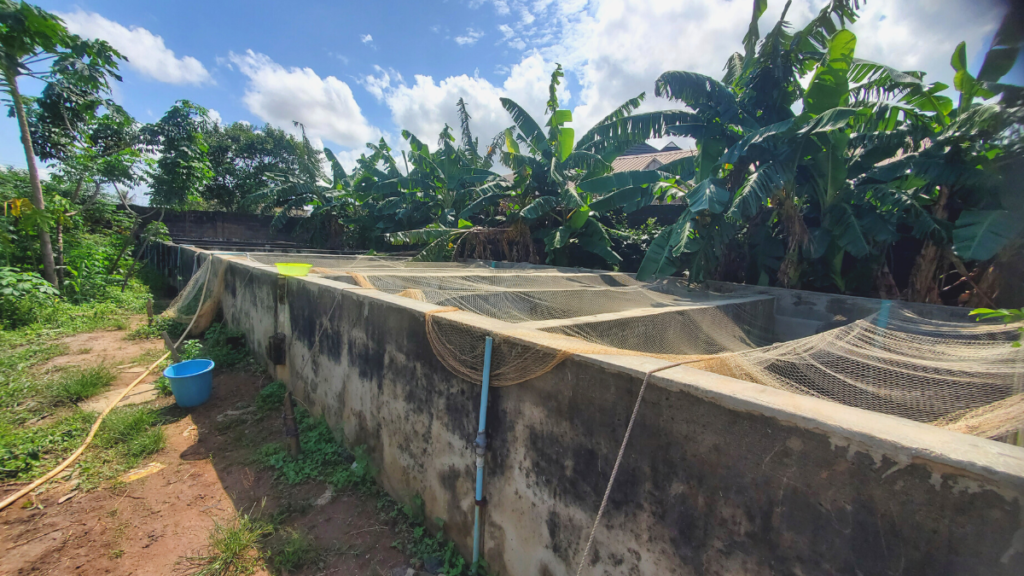
The next thing you need to start a fish farm is a protective net. This is not as important as other items but if you are going to be stocking your fish in an earthen pond, it is required to have a protective net.
This will help keep predators away from the fish especially when they are still very small.
8. Fish
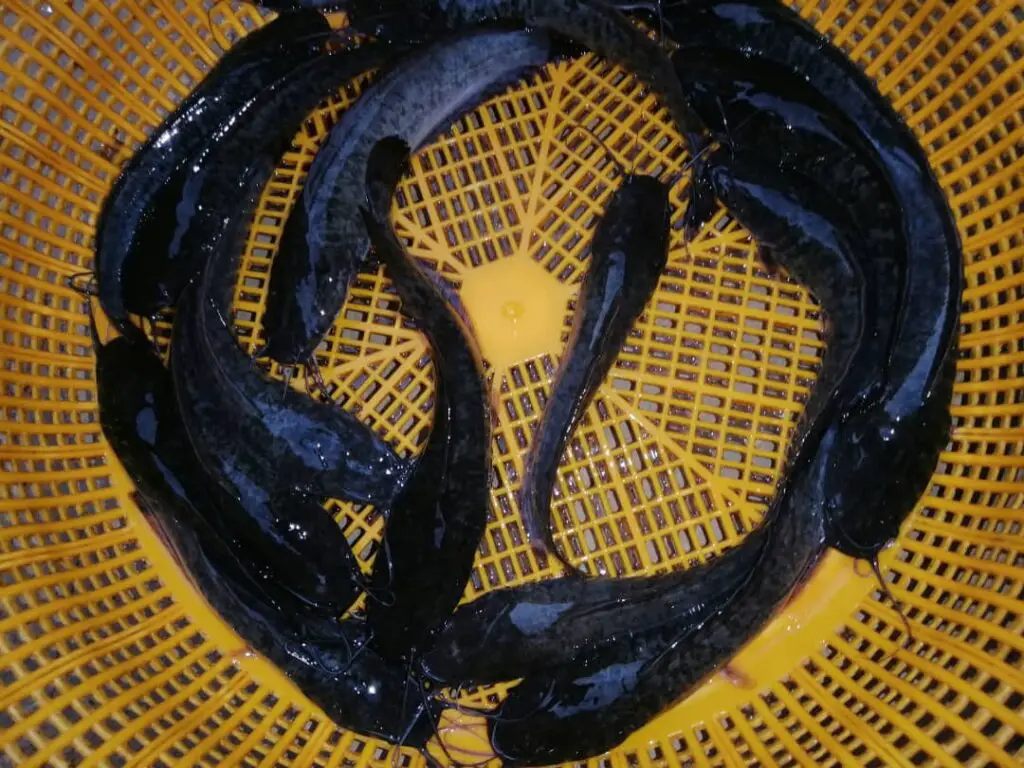
The main reason why you have been spending so much on the equipment is for your fish to be comfortable.
Next is to stock your pond with fish. At this stage, the success of your farm will depend on the fish you stock.
You need to see that you get your fish (fries, fingerlings, or juveniles) from a reliable source.
If you buy runt fish, you will just be spending money to feed them without any result.
Some time ago, one of my mentees went to buy fingerlings from a farm while I was away and it ended up being a bad experience for him. This happens a lot.
Before you buy fish, you need to determine what size of fish you should stock especially if you’re a beginner. To further help you out, read this article on the best size of fish to stock on your farm.
Read it and choose well.
Need to buy fish? You can contact me.
9. Feeds
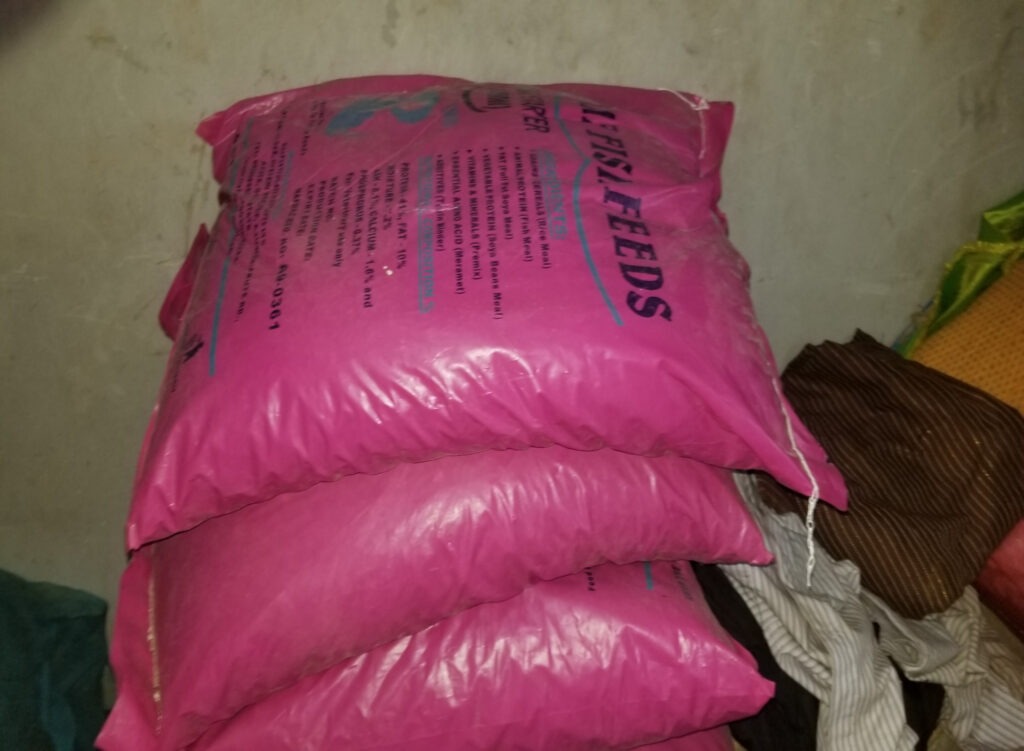
The next success factor aside from getting quality fish from a reliable source is the feed you give your fish. In this part of the world, Nigeria, there are different types of feed you can give your fish.
While it is not possible to give your fish 100% natural feed, you need to see that the supplementary feed you give them is good.
I won’t recommend any brand of feed for you to use but you can use your discretion to choose a good feed.
10. Personnel
The final requirement if you want to start a fish farm is Personnel.
You need someone that will be managing the day-to-day activity of the farm. If you are running a small-scale farm, then you can be your manager.
But if you are going commercial, then you will need to employ the service of personnel that will be feeding them, changing the water, and checking on them to see if there are no issues on the farm.
At the very beginning of your farm, you will need to be on the ground often to oversee things yourself. When interviewing personnel for your farm, make sure they are reliable and experienced in fish farming.
You need to take care of your workers and treat them well. I have an article on choosing workers for your farm so they can handle your investment well.
Poor management of the farm can lead to the loss of your investment.
How To Sell Your Fish
When you eventually start a fish farm, at some point, you need to harvest and sell them.
How do you sell your fish?
You can sell your fish to bars, hotels, individuals, restaurants, market women, etc.
Some people are ready to buy your fish when they are ready for harvest. This is part of the research you need to do before you start your fish farm.
If you are a newbie in fish farming, you need to start marketing your fish when they are a month away from harvest.
This is important because you don’t want a situation where your fish are ready for harvest and there is no one to buy them.
Frequently Asked Questions About Catfish Farming
- How much will it cost to start a fish farm?
The cost of starting a catfish business will depend on your pocket and the quantity of fish you want to start with.
If you want to start raising catfish on a small scale, with a minimum of say ₦ 50,000 ($128), you will be able to start a small-scale fish farm.
If you want to go into processing and packaging, you can start with nothing. You can get the fish from people that smoke the fish and negotiate with them.
- How often should you feed your fish?
If the fish are still young (fries, fingerlings, and juvenile), you should feed them 3 times a day.
However, you should monitor them to see if they are ok or not so that you don’t overfeed the fish.
- How often should I change my catfish pond water?
The number of times you change your fish pond water depends on the types of ponds you are using to raise the fish.
For plastic ponds, you should change the water at least every two days. If you have the bandwidth, you can adopt the flow-through system.
- How do I sell my catfish?
There are different methods you can use to sell your catfish.
i. Sell in bulk to market women
ii. Smoke and process the fish
iii. Sell directly to individual consumers
iv. Sell to bars, restaurants, hotels, etc.
- Is there money in fish farming?
One of the most lucrative businesses you can venture into is catfish farming. You can explore different opportunities if you decide to enter the business. Therefore, there is money in fish farming.
- How much money can you make raising catfish?
Depending on the quantity you decide to raise. To some certain level, you can make at least 40% of the capital you invest in the business
- How do catfish farmers make money?
There are different ways catfish farmers make money. You can read this article I wrote on ways to make money from fish farming.
- How do you know a good fish?
From the moment you stock your fish, you will know if your fish are ok or they are just runt.
- How long does it take a catfish to mature?
Catfish take from 4 months to mature. The fish will not grow at the same pace which makes you want to give space for them and say within 4 to 5 months to grow.
Although there are farmers that sell their fish at 3 months old (they call these fish melange).
The duration for fish to mature depends on the cycle you want to run either melange or table size.
- What makes catfish grow faster?
Different factors contribute to the quick growth of catfish. They include but are not limited to:
- Feed
- Water
- Space
- Management
- The species of the fish
- Is catfish dangerous to eat?
Catfish are one of the healthy animals you can consume. It contains low calories and has lean protein. Catfish contains a rich amount of Omega 3 and vitamin B12.
Unless stated otherwise by your doctor, catfish is one of the good sources of protein you can eat.
- How quickly will I make money from fish farming?
Making money from fish farming depends on the aspect of catfish you decide to go into. For example, if you are selling smoked catfish and you know how to market your products very well, you will start making money immediately.
If you are raising from fingerlings and juvenile to table size, you won’t make money until after 4 to 5 months.
- How risky is catfish farming?
As much as there is money in fish farming, the risk involved also is high especially if you raise them in an earthen pond.
If there is a flood, the chance that it will affect your catfish is very high although this is a one-off thing.
Conclusion
Congratulations, you have finally decided to take the bull by the horn and start a fish farm.
To recap, if you want to start fish farming at home or anywhere, below are things you need to start a fish farm:
- Capital
- Location
- Ponds
- Water
- Source of Power
- Overhead Tank
- Nets
- Fish
- Feeds
- Personnel
You will make mistakes as you run the day-to-day activities but not to worry we have all been there before. This is just a learning curve for you.
What you need to do is to make your mistakes a lesson and never repeat such mistakes.
If you want any help on how to start a fish farm, we are here to help you.
Cheers to your success. If you find this article helpful, do well to share it.
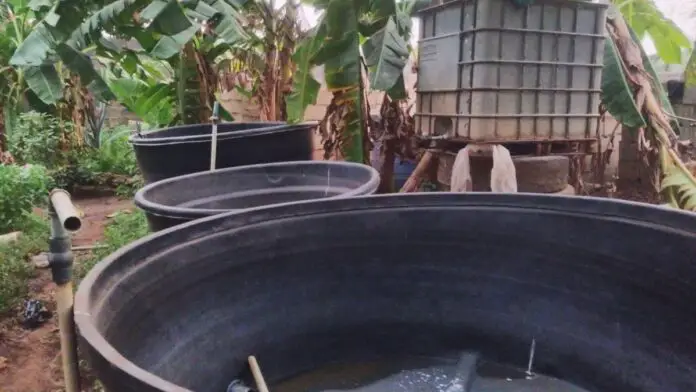


[…] you want to know how to start a fish farm, then you can read the article I made about […]
[…] are other things you need to start a fish farm business, but ponds are as important as the other requirements of fish […]
[…] Want an extensive guide on start a catfish business? Read this article. […]
[…] Read this article on how to start a fish farm […]
[…] it comes to fish farming, feed is one of the most important things that contribute to the success of the business. No matter […]
[…] Whatever you have at the moment is good enough for you to start something, don’t be idle. The goal is to start small and grow big. If you are determined to start, you can read this article on how to start a fish farm. […]
Good day sur, ur articles always on point, educative and straightforward. God bless you more bro Olagunju
[…] have started your fish farm mostly without any issue, two months have gone and one day you wake up to go check up on your fish […]
[…] you’re wondering how to start a fish farming business and need some […]
What kind of feed will I use on my fries, fingerlings, juvenile
You can read this article – https://agricfy.com/7-types-of-fish-feeds-in-nigeria/
[…] Catfish farming is one of those simple fish farming business ideas that have the potential to be very profitable due to its nutritional value and commercial demand. Catfish can be raised in tanks and ponds. And this guarantees a prompt profit in this industry. […]
[…] Source: ? […]
I love looking through and I believe this website got some truly utilitarian stuff on it! .
I have recently started a site, the info you provide on this website has helped me greatly. Thank you for all of your time & work.
Greetings! Very helpful advice on this article! It is the little changes that make the biggest changes. Thanks a lot for sharing!
Wonderful blog! I found it while searching on Yahoo News. Do you have any tips on how to get listed in Yahoo News? I’ve been trying for a while but I never seem to get there! Appreciate it
There is perceptibly a lot to realize about this. I believe you made some good points in features also.
Howdy! I’m at work browsing your blog from my new iphone! Just wanted to say I love reading through your blog and look forward to all your posts! Keep up the great work!
[…] times, there has been a lot of request about starting an agribusiness, from poultry farming to fish farming, and pig farming among others but one thing I noticed is these people don’t know jack about what […]
Good website! I really love how it is easy on my eyes and the data are well written. I’m wondering how I could be notified when a new post has been made. I’ve subscribed to your feed which must do the trick! Have a great day!
Thank you very much, this was really encouraging God bless you immensely
Thanks so much,Very comprehensive and educative.
[…] people reach out to me about starting a fish farm and I ask them what’s their budget, they get confused about how much they need to kick-start the […]
[…] such issues before but if you’ve not maybe because you just started or you’re just thinking of starting a fish farm, you’ll learn how to control […]